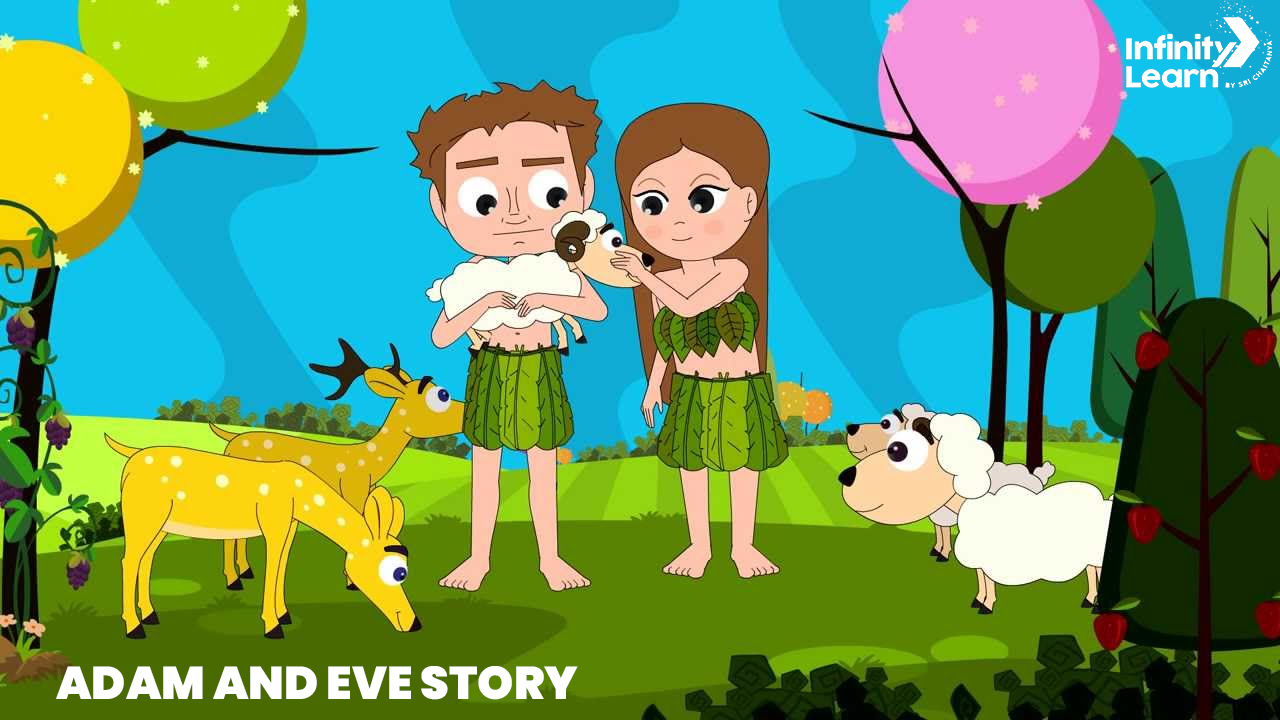Table of Contents
Discover the timeless tale of Adam and Eve, teaching kids the importance of trust, obedience, and the value of rules in a captivating narrative.
Introduction of the Adam and Eve Story
In a realm where myths and legends dance to the rhythm of our imagination, we often encounter tales of cosmic creation by the divine hand. As we journey through the mosaic of our lives, some of the most treasured moments are intricately woven with the threads of these enchanting narratives.
These stories, unlike any other, possess the uncanny ability to ensnare our senses, marrying the captivating with the instructive. Among this rich tapestry of tales, there exists the ageless saga of Adam and Eve, unveiled in a narrative artfully crafted in simple English, nestled within the folds of this article. Our mission? To offer a narrative as unique as the story itself, a narrative designed to engage and enlighten, all the while ensuring it resonates with the young hearts and minds it seeks to inspire.

Adam and Eve Story for Kids
Once upon a time, God created our world, with the Earth, sun, and moon. His finest creation was a man named Adam. God breathed life into Adam and gave him the task of taking care of the land.
With divine breath, God filled Adam with life and entrusted him with the duty of tending to the land. Eden, a paradise of breathtaking beauty, became Adam’s home. Within its borders, vibrant plants and trees flourished, bearing fruits that delighted the senses, such as apples, oranges, strawberries, and grapes.
In this utopian haven, God imparted a singular rule to Adam: he could relish the garden’s offerings, play with its creatures, swim in its refreshing rivers, and savor the fruits from any tree, with one notable exception. At the heart of the garden stood a colossal tree, and God’s warning to Adam was unequivocal: never should he partake of the apples from this forbidden tree.
Adam, obedient and content, reveled in the garden’s abundance. However, as time flowed on, he began to experience the pangs of loneliness.
God, ever watchful and compassionate, observed Adam’s solitude and resolved to provide him with a companion. This new creation was a woman, and God lovingly named her Eve.
Eve became the missing piece of the puzzle in Adam’s life, bestowing upon him joy and companionship. Together, they tended to the garden’s myriad inhabitants, from the gentle animals to the melodious birds. They reveled in the enchantment of Eden, where adventures with the animals abounded, and their shared efforts kept the garden resplendent.
One fateful day, as they wandered through the garden’s lush beauty, the allure of a luscious apple, dangling enticingly from the forbidden tree, captivated Adam and Eve’s attention.
A crafty snake perched on the tree sought to persuade them, casting aside God’s warning. The snake insinuated that by partaking of the tree’s apples, they would attain knowledge, and that this apple was the juiciest and most desirable of all.
Adam, apprehensive of breaking God’s rule, voiced his concerns to the snake. But the snake skillfully allayed their fears, convincing them that tasting the forbidden fruit would do no harm and would, in fact, grant them wisdom.
The temptation proved too great, and Adam and Eve succumbed to it, sharing in the consumption of the forbidden apple.
God, in His divine wisdom, perceived their disobedience and was consumed by anger. As a consequence, He decreed a punishment: they must depart from the cherished garden of Eden and toil tirelessly on Earth, learning the value of hard work and obedience.
And so, in their journey from paradise to the world beyond, Adam and Eve embarked on a new chapter of life, marked by both trials and the lessons they would learn along the way.
Moral of the Story
The story of Adam and Eve imparts a vital moral lesson for children: trust in God and follow the guidance of elders, as disregarding rules can lead to difficulties in life. This narrative teaches obedience, respect for authority, and the importance of understanding that rules are set for our well-being. Such stories not only entertain but also instill values, responsibility, and empathy in children while enhancing their vocabulary and critical thinking skills. Adam and Eve’s tale is a timeless bridge between generations, passing down wisdom and values, making it a valuable tool for teaching children about life’s lessons.
Frequently Asked Questions on Adam and Eve Story
What is the central moral lesson in the story of Adam and Eve?
The central moral lesson is to trust in God and obey the guidance of elders, as disobeying rules can lead to life's difficulties.
What was the forbidden rule God gave to Adam and Eve in the garden of Eden?
God's rule was clear: Adam and Eve could enjoy everything in the garden except the apples from a specific tree in the center.
Why did God create Eve as a companion for Adam?
God created Eve to provide companionship and alleviate Adam's loneliness in the garden.
What was the consequence of Adam and Eve eating the forbidden apple?
Their disobedience led to God's anger, resulting in their expulsion from the Garden of Eden and a life of toil on Earth.
How does the story of Adam and Eve teach important values to children?
The story instills values like obedience, respect for authority, and understanding the importance of rules for our well-being, while also enhancing children's vocabulary and critical thinking skills.



